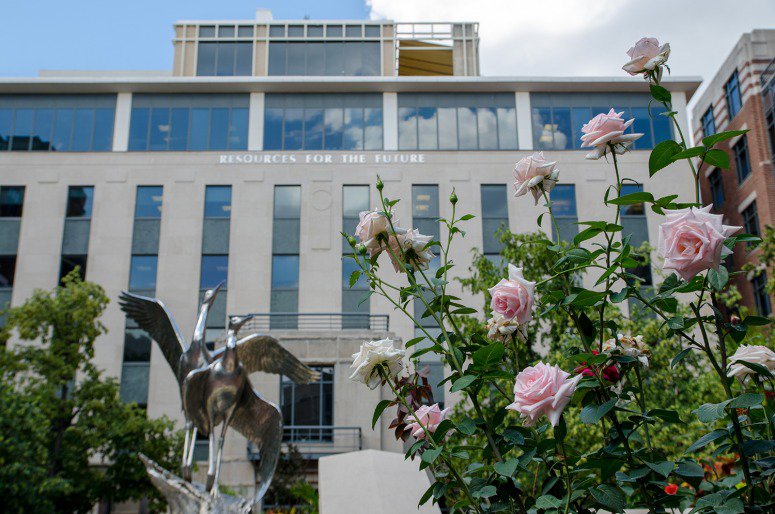Former RFF President Emery Neal Castle passed away at the age of 93 on October 31, 2017, in Portland, Oregon. Castle was a pioneer in resource and agricultural economics, a treasured mentor to many, and a pivotal player in ensuring RFF’s future. During his tenure as president (1978–1986) he successfully shepherded RFF’s transition into the thriving, financially independent institution it remains today. Here we offer tributes from some of Emery’s colleagues and friends.

“Our profession lost an icon with the passing away of Emery Castle. During his illustrious sixty-years-plus career, Emery influenced several generations of agricultural and resource economists, and has been a guiding light of our profession. Emery possessed a rare combination of scholarship and leadership. He played important leadership roles at both Oregon State University and Resources for the Future, and at the same time, made important contributions to at least three subfields of applied economics: farm business management, resource economics, and rural studies. His book, Farm Business Management, coauthored with Manning H. Becker, was first published in 1962 and has since been translated into several languages. Working with Bill Brown, in 1964, Emery published one of the first papers that use an economic framework to estimate the value of outdoor recreation. Later on in his career, Emery turned his attention to rural people and places. He created the National Rural Studies Committee (NRSC). Some of the findings of the committee were summarized in a book he edited. The book has become a must read for people interested in rural people and places. Emery welcomed opportunities to put his knowledge to work. Five Oregon governors appointed Emery to boards and commissions. Indeed, Emery made this world a better place to live, and his legacy will last forever.”
—Junjie Wu, Professor and Emery N. Castle Endowed Chair in Resource and Rural Economics, Oregon State University

Emery Castle (second from right) pictured in 2015 with then RFF President Phil Sharp (left), former RFF President Paul Portney (second from left), and then RFF Vice President for Finance and Administration Ted Hand.
“Emery’s life was an inspiration. I only knew him personally later in his life (though I knew of his work much earlier of course). I was amazed by his intellect, curiosity, and thoughtfulness about research and policy issues and his kindness and graciousness to everyone around him. He truly was a pleasure to be around. Emery contributed substantively to the economics profession on many important topics, but an area that he remained passionate about all his life was rural studies and its connection with natural resource economics. Emery felt that we needed more research at the intersection of rural, regional, and resource economics. I think these issues resonate today and hopefully a new generation of economists will carry on Emery’s legacy.”
—Margaret Walls, Senior Fellow, RFF
“Working hand in hand, Emery Castle and Gilbert White (then chair of the RFF Board of Directors) raised the money that the Ford Foundation required in order to receive a matching gift from the foundation. Those funds together became RFF's endowment. Without Emery and Gilbert's tireless efforts, the strong and independent RFF we know today might never have survived. In April 2002, I was very pleased to dedicate the Emery Castle Rose Garden at RFF as part of RFF’s 50th anniversary celebrations. It is a very fitting tribute that endures to this day.”
—Paul Portney, former RFF President (1995–2005)

Emery N. Castle Rose Garden
“Emery Castle had a vision for RFF. He saw RFF as an independent institution providing high quality objective research to inform public policy. Emery was the key driver in making that vision a reality. For the first 25 years of RFF’s existence, it was fully funded by the Ford Foundation. In the late 1970s, Ford informed RFF that it was changing its funding model and suggested that RFF should be merged into the Brookings Institution. Ford would offer Brookings a dowry of $7 million. This being antithetical to Emery’s vision, he led a group that responded to Ford. They agreed to make a $7 million matching grant to RFF with the proviso that the matching funds be raised within 90 days. Under Emery’s leadership, the funds were raised and RFF continues to fulfill Emery’s vision today. Among his many accomplishments in life, 'RFFers' remember Emery Castle as an institution builder and will be forever in his debt. Thank you Emery.”
—Ted Hand, former RFF Vice President of Finance and Administration
“Emery played an important role at a critical time at RFF to ensure its continued vitality. After that, he remained close to the organization and was a stalwart supporter. He was very generous with his valuable insights on the importance of economic research addressing practical policy questions. I found him to be a great resource during my time at RFF. His magnificent rose garden is enjoyed by everyone at RFF and in the neighborhood.”
—Phil Sharp, former RFF President (2005–2016)







